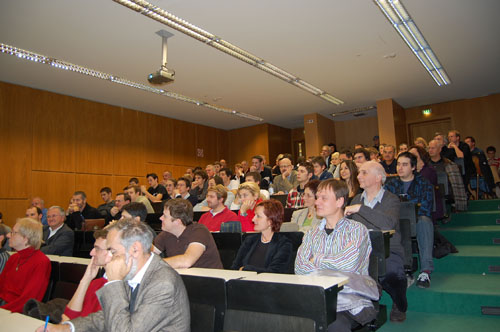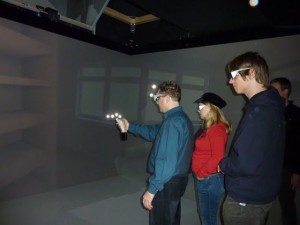 Die Studenten aus dem Kurs Computer Games Lab und einige Interessierte saßen Freitag (27.11. 2009) im Bus nach Graz. Am Institut für Computergraphik und Wissensvisualisierung angekommen gab es eine 2-stündige Einführung von Marcel Lancelle und Volker Settgast in 3-dimensionale Darstellung mit Shutterbrillen, Farb- und Polarisationsfiltern und anderen Techniken. In der eindrucksvollen Cave konnten dann alle durch die Nationalbibliothek fliegen, ein Zimmer einrichten und manche konnten sogar am Bauch liegend eine Runde TuxRacer spielen.
Die Studenten aus dem Kurs Computer Games Lab und einige Interessierte saßen Freitag (27.11. 2009) im Bus nach Graz. Am Institut für Computergraphik und Wissensvisualisierung angekommen gab es eine 2-stündige Einführung von Marcel Lancelle und Volker Settgast in 3-dimensionale Darstellung mit Shutterbrillen, Farb- und Polarisationsfiltern und anderen Techniken. In der eindrucksvollen Cave konnten dann alle durch die Nationalbibliothek fliegen, ein Zimmer einrichten und manche konnten sogar am Bauch liegend eine Runde TuxRacer spielen.
Der menschlichen Stimme auf der Spur
24. November 2009
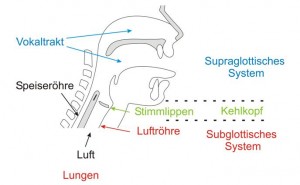 Der Förderverein Technische Fakultät lädt ein zum Vortrag „Der menschlichen Stimme auf der Spur“ von Univ.-Prof. Dr. Manfred Kaltenbacher, Institut für Intelligente Systemtechnologien, Forschungsgruppe Angewandte Mechatronik. [PDF-Version der Einladung]
Der Förderverein Technische Fakultät lädt ein zum Vortrag „Der menschlichen Stimme auf der Spur“ von Univ.-Prof. Dr. Manfred Kaltenbacher, Institut für Intelligente Systemtechnologien, Forschungsgruppe Angewandte Mechatronik. [PDF-Version der Einladung]
Das Kolloquium findet im Anschluss an die Generalversammlung statt. Eintritt frei!!!
Kurzfassung: Die Stimme, dessen Grundsignal im Kehlkopf entsteht, ist Voraussetzung für die Sprache. In den heutigen Dienstleistungsgesellschaften werden bei ca. 60% der Beschäftigungsverhältnisse sprachliche Grundfähigkeiten vorausgesetzt. Im Jahr 2000 wurde der wirtschaftliche Schaden in den USA aufgrund von Kommunikationsstörungen auf $186 Milliarden geschätzt.
Das Stimmsignal entsteht im Kehlkopf durch die beiden zwischen 100 – 400 Hz periodisch schwingenden Stimmlippen (umgangssprachlich auch Stimmbänder genannt). Die dreidimensionalen Stimmlippenschwingungen, sowie Zusammenhänge zwischen Stimmlippendynamik und Qualität des akustischen Signals sind weitgehend unerforscht. Durch das in den letzten Jahren verstärkte interdisziplinäre Zusammenarbeiten von Medizinern, Ingenieuren, Informatikern und Mathematikern konnten jedoch einige grundlegende Fragen geklärt werden.
Das Zie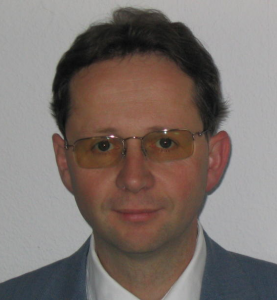 l der heutigen Stimmforschung ist es, ein umfassendes Verständnis der Zusammenhänge zwischen der Strömung, der Stimmlippenschwingungen und dem erzeugten Schall zu erlangen, um mittelfristig klinische Therapieverläufe unterstützen zu können. Langfristiges Ziel ist das Ersetzen von Teilen oder des ganzen Kehlkopfes nach Kehlkopfkrebs mit synthetischen Materialien oder gezüchtetem Gewebe.
l der heutigen Stimmforschung ist es, ein umfassendes Verständnis der Zusammenhänge zwischen der Strömung, der Stimmlippenschwingungen und dem erzeugten Schall zu erlangen, um mittelfristig klinische Therapieverläufe unterstützen zu können. Langfristiges Ziel ist das Ersetzen von Teilen oder des ganzen Kehlkopfes nach Kehlkopfkrebs mit synthetischen Materialien oder gezüchtetem Gewebe.
Univ.-Prof. Dr. Manfred Kaltenbacher leitet die Forschungsgruppe Angewandte Mechatronik am Insitut für Intelligente Systemtechnologien. Forschunsprojekte, Publikationen, wissenschaftliche Veranstaltungen, Vorträge, etc. finden sie hier.
Nach dem Vortrag sind die Teilnehmer zu einem Buffet eingeladen und aus organisatorischen Gründen bitten wir daher um eine kurze Anmeldung per Mail an Klothilde.Puschl@uni-klu.ac.at.
Posted in TEWI-Kolloquium Kommentare deaktiviert für Der menschlichen Stimme auf der Spur
Einladung zur Generalversammlung
19. November 2009
Der Förderverein Technische Fakultät an der Universität Klagenfurt lädt Sie hiermit herzlich zur Generalversammlung ein.
Wann: Mittwoch 9. Dezember 2009, 15:30 – 17:00 Uhr
Wo: Alpen-Adria Universität Klagenfurt, Raum Nr. Z.1.29, Universitätsstrasse 65-67, 9020 Klagenfurt
Tagesordnung:
- Begrüßung
- Genehmigung der Tagesordnung
- Genehmigung des Protokolls der letzten Generalversammlung
- Bericht des Obmanns
- Diplomarbeitspreis 2008: Kurzpräsentation der Arbeit
- Bericht des Geschäftsführers
- Bericht der Rechnungsprüfer
- Budget 2010
- Allfälliges
Anschließend findet ein Vortrag von Univ.-Prof. Dr. Manfred Kaltenbacher, Institut für intelligente Systemtechnologien, Forschungsgruppe Angewandte Mechatronik, zum Thema „Dem Rätsel der menschlichen Stimme auf der Spur“, statt.
Mit freundlichen Grüßen
Christian Inzko (Obmann) & Christian Timmerer (Geschäftsführer)
P.S.: Das Protokoll der vorjährigen Generalversammlung finden Sie hier.
Posted in Veranstaltungen Kommentare deaktiviert für Einladung zur Generalversammlung
Ankündigung Exkursion: Besuch einer 3D Cave an der TU Graz
18. November 2009

User in der Cave
Im Rahmen der Veranstaltung „Computer Games Lab“ besuchen wir mit den Studierenden die 3D Cave DAVE am Institut für ComputerGraphik und WissensVisualisierung (CGV) an der TU Graz. In Gruppen zu 10 Leuten können sich die Leute die Cave ansehn. Danach gibt es eine Einführung in die Programmierung der Cave.
Was ist eigentlich eine Cave? Eine Cave besteht aus mehreren Projektionswänden, die einen User umgeben. Durch die Nutzung einer Shutter-Brille entsteht in Verbindung mit den richtigen Programmen eine 3-dimensionale Welt um den Benutzer herum. So wird ein viel besserer räumlicher Eindruck vermittelt, da der Benutzer „im Raum steht“ anstatt durch den Monitor hinein zu blicken.
Bei Interesse kann man sich bei Mathias Lux für die Teilnahme anmelden, ein paar Plätze sind noch übrig. Die Unkosten werden von der Fakultät dem Förderverein und der ÖH übernommen.
Termin: 27. Nov. 2009, Zeit 11.oo – 19.oo Uhr (~)
Posted in Veranstaltungen, News Kommentare deaktiviert für Ankündigung Exkursion: Besuch einer 3D Cave an der TU Graz
Neues Forschungskompetenzzentrum an der Technischen Fakultät
18. November 2009
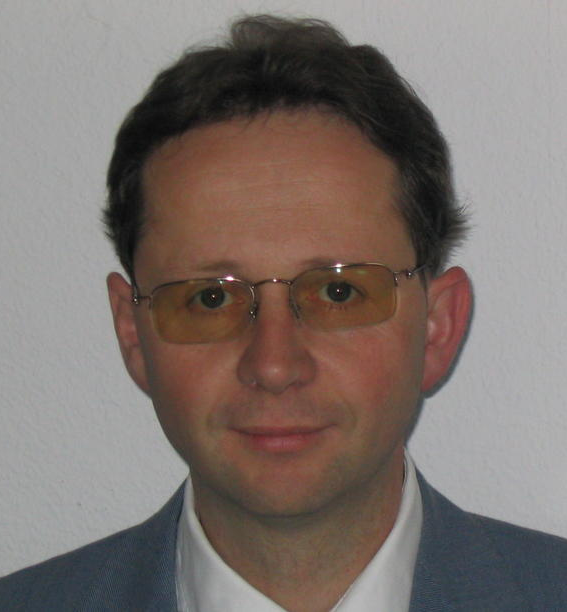 Großer Erfolg für das Institut für Intelligente Systemtechnologien der Technischen Fakultät. Der K1-Antrag ACMIT (Austrian Center for Medical Innovation and Technology) innerhalb des Förderprogramms COMET (Competence Centers for Excellent Technologies) wurde als eines von vier neuen K1-Zentren in Österreich bewilligt.
Großer Erfolg für das Institut für Intelligente Systemtechnologien der Technischen Fakultät. Der K1-Antrag ACMIT (Austrian Center for Medical Innovation and Technology) innerhalb des Förderprogramms COMET (Competence Centers for Excellent Technologies) wurde als eines von vier neuen K1-Zentren in Österreich bewilligt.
Die Universität Klagenfurt ist dabei durch Univ.-Prof. Dr. Manfred Kaltenbacher vom Institut für Intelligente Systemtechnologien vertreten, welcher als Key Researcher den Bereich Sensors for Process Control, Treatment Monitoring and Evaluation leiten wird.
ACMIT konzentriert Wissen im Bereich der Medizintechnik und wird sich mit neuen Ansätzen im Bereich der Minimal Invasiven Operationstechnik beschäftigen. Dabei werden die Forschungsaktivitäten in die folgenden vier Bereiche unterteilt
- Technology and processes for the treatment of bones and tissues
- Medical Robotics and Positioning Systems
- Sensors for Process Control, Treatment Monitoring and Evaluation
- Work-Flow, Simulation and Human-Machine Interface
Dies ist ein weiterer erfolgreicher Schritt in Richtung des technischen Ausbaus der Alpen-Adria-Universität Klagenfurt.
Manfred Kaltenbacher
Weitere Informationen finden Sie hier.
Posted in News Kommentare deaktiviert für Neues Forschungskompetenzzentrum an der Technischen Fakultät
Förderpreis der Technischen Fakultät: Ausschreibung 2009
16. November 2009
 Ausschreibung 2009
Ausschreibung 2009
Förderpreis der Technischen Fakultät
Prämierung der besten Diplom- bzw. Magisterarbeit aller Studien der Technischen Fakultät an der Universität Klagenfurt
Der Förderverein Technische Fakultät an der Universität Klagenfurt schreibt die Prämierung der besten Diplom- bzw. Magisterarbeit aller Studien der Technischen Fakultät an der Universität Klagenfurt des laufenden Studienjahres aus.
Der Preis besteht aus einer Urkunde und einer Prämie in Höhe von
EUR 1.500,–
Die Jury ist ermächtigt den Preis gegebenenfalls zwischen mehreren Diplom- bzw. Magisterarbeiten zu teilen. Antragsberechtigt sind Absolventinnen und Absolventen aller Studienrichtungen der Technischen Fakultät der Universität Klagenfurt, deren Diplom- bzw. Magisterarbeit mit „Sehr Gut“ beurteilt wurde. Es werden nur Diplom- bzw. Magisterarbeiten bewertet, die im Zeitraum vom 1. November 2008 bis zum 31. Oktober 2009 fertiggestellt wurden. Als Fertigstellungstermin gilt der Tag der Ausstellung des Gutachtens. Die Einreichfrist für die Verleihung des Preises für das Jahr 2009 endet am 31. März 2010 (Achtung: Verlängerung).
Der Antrag ist beim Geschäftsführer des Förderverein Technische Fakultät an der Universität Klagenfurt einzureichen. Er hat neben der gebundenen Diplom- bzw. Magisterarbeit (zweifach) ein Gutachten des Betreuers der Diplom- bzw. Magisterarbeit und allfällige Software (oder Verweise auf existierende Software) zu enthalten (die Rückgabe der Diplom- bzw. Magisterarbeitsexemplare nach der Begutachtung wird nicht garantiert). Weiters ist die Diplom- bzw. Magisterarbeit elektronisch als PDF-Datei oder Postscriptdatei und eine Zusammenfassung als Textdokument abzugeben. Diese Zusammenfassung soll so geschrieben sein, dass sie auch für Nicht-ExpertInnen verständlich ist!
Beurteilungskriterien für die Zuerkennung des Preises sind strikt fachlicher qualitätsbezogener Natur. Sie umfassen die Aspekte:
- wissenschaftlicher Gehalt,
- Innovationsgehalt und Umsetzbarkeit,
- Klarheit der Darstellung und Qualität der Ausführung.
Die Zuerkennung des Preises erfolgt durch eine Jury. Die Jury besteht aus:
- dem Obmann des Förderverein Technische Fakultät an der Universität Klagenfurt (Vorsitz),
- je einem Vertreter der TEWI-Institute der Universität Klagenfurt und
- zwei Vertretern der institutionellen Mitglieder des Förderverein Technische Fakultät an der Universität Klagenfurt.
Der Geschäftsführer des Förderverein Technische Fakultät an der Universität Klagenfurt kann zu den Sitzungen der Jury als nichtstimmberechtigtes Mitglied beigezogen werden. Die Sitzungen der Jury sind geschlossene Sitzungen und die Entscheidungen der Jury sind endgültig. Der Rechtsweg ist ausgeschlossen.
Die Preisverleihung findet üblicherweise im Rahmen der TEWI-Semestereröffnung im Oktober 2010 statt.
Posted in News Kommentare deaktiviert für Förderpreis der Technischen Fakultät: Ausschreibung 2009
Specification Comprehension – Konzeptverwaltung am Beispiel zustandsbasierter Spezifikationen
9. November 2009
… ist der Titel einer der besten Diplom- bzw. Magisterarbeiten aller Studien der Technischen Fakultät an der Universität Klagenfurt und wurde vom Förderverein Technische Fakultät mit EUR 750,– ausgezeichnet. Die Autorin und Preisträgerin, Frau DI Daniela Pohl, ist nun Mitarbeiterin am Institut für Informatiksysteme, Forschungsgruppe „Software Engineering und Soft Computing„, und arbeitet dort als Universitätsassistentin unter anderem an ihrer Dissertation. Der Preis wurde im Rahmen der Eröffnung des akademischen Jahres 2010/2011 übergeben und wir möchten ihre Diplom- bzw. Magisterarbei kurz vorstellen.
Kurzfassung:
Man stelle sich vor, man stünde vor einem großen, schönen Haus mit einem einzigen Haken, einem Schild an der Türe: „Betreten des Hauses auf eigene Gefahr!“. Würden Sie freiwillig eintreten?
Eigentlich stehen wir vor dem gleichen Problem wenn man an die Software‐Entwicklung denkt. Wer garantiert, dass Software auch dies hält, was sie verspricht oder zu versprechen scheint? Wenn man ehrlich ist: nicht immer kann es versprochen werden. Um sicherzustellen und zu überprüfen ob eine Software die Anforderungen hält, muss man in erster Linie eine Möglichkeit finden, sie zu bewerten. Dafür muss eine Software aber leichter und besser verstanden werden. Das Verstehen ist sowohl während als auch bei Aktivitäten nach der eigentlichen Entwicklung, wie der Wartung, notwendig. Dies ermöglicht es erst zu entscheiden, ob die Vorstellungen und Versprechungen der Software erfüllt wurden. [MBPR01, S 95] Dieser Gedanke bildet die Basis meiner Arbeit: die Unterstützung des Verstehens der Eigenschaften von Software. Dafür müssen Konzepte der Software identifiziert, sowie deren Zusammenhänge verstanden werden. Um diesen Prozess zu unterstützen wurde ein Framework implementiert. Es wurde dabei so konzipiert, dass es mit beliebigen Dokumenten umgehen kann. Exemplarisch werden im Rahmen der Arbeit formale Z‐Spezifikationen herangezogen.
Die Welt ist voller Konzepte und Abhängigkeiten. Somit beinhalten auch Dokumente der Softwareentwicklung, von Analysedokumenten über Design, bis hin zur Implementierung, Konzepte und Abhängigkeiten. Durch Änderungen im Projekt finden auch Änderungen der Konzepte im Dokument statt. Sie werden hinzugefügt, verworfen oder ausgebaut. Das Verständnis dieser Dokumente ist immer notwendig, daher gilt es den Verständnisprozess bestmöglich zu unterstützen. Dokumente besitzen eine bestimmte Struktur. Diese Struktur besteht aus unterschiedlichen Teilen, bei einem normalen Schriftstück zum Beispiel aus Kapiteln, Absätzen und Sätzen. Für das Gesamtverständnis müssen Teile innerhalb von Dokumenten häufig miteinander in Verbindung gebracht werden. Auch Verweise auf andere Dokumente können notwendig sein. Die im Dokument enthaltenen Teile beschreiben bestimmte, notwendige Konzepte und deren Zusammenhänge. Meist werden im Text beschriebene Konzepte und Zusammenhänge falsch interpretiert, weil sie vielleicht im Widerspruch mit unseren Vorstellungen stehen, oder sie werden auch einfach übersehen. Konzepte bilden ein wichtiges, wenn nicht sogar ein mächtiges, Hilfsmittel im Verständnis von Dokumenten jeglicher Art.
Ein Softwareprojekt, unabhängig vom dahinterliegenden Prozessmodell, besteht aus verschiedenen Phasen und Abschnitten, welche innerhalb der Laufzeit auch mehrmals durchlaufen werden können. Während jeder dieser Phasen werden Dokumente erstellt, in denen das Wissen und die Erkenntnisse über die entstehende Software festgehalten werden. Ideen werden dabei ausgebaut, verworfen oder neu aufgenommen. Dokumente weisen daher komplexe, umfangreiche Inhalte auf. Diese Dokumente werden erstellt, um den Entstehungsprozess zu unterstützen und zu erleichtern, um Informationen über Projektgrenzen hinweg zu kommunizieren und für die späteren Phasen festzuhalten. Dafür müssen Dokumente, von jedem der sie verwendet, verstanden werden. Während es einem einfach erscheint, Dokumente, welche man selbst geschrieben hat, zu verstehen, sind Dokumente aus anderen Quellen nicht immer sofort klar und verständlich.
Der Ursprung des Konzeptes stammt aus der Philosophie. Konzepte beschreiben Generalisierungen oder Abstraktionen, abgeleitet von spezifischen Merkmalen der Instanzen. Immanuel Kant, als einer der bedeutendsten Philosophen, beschreibt Begriffe für das Verstehen von Konzepten als eine notwendige Vorraussetzung für die Erkenntnis im Denkprozess [HaSc88]. Der Begriff bildet eine Abstraktion des Gesehenen aufgrund von unterschiedlichen Merkmalen ab. Dadurch wird es einem beispielsweise ermöglicht zwischen einer normalen Funkfernbedienung und einem Mobiltelefon zu unterscheiden. Genau diese Begriffe geben den Konzepten einen Namen und lassen uns mentale Modelle unserer Welt aufbauen und verstehen. Oft wird davon gesprochen, dass man sich ein mentales Modell aufbauen muss, um Dokumente verstehen zu können. Durch das mentale Modell kann die ursprüngliche Idee hinter dem Dokument aufgegriffen werden. Dies ist sowohl in Bereichen der Software‐Wartung und Evolution, als auch in der normalen fortschreitenden Entwicklung notwendig, vor allem wenn Informationen aufgrund der Menge vergessen werden oder neue Projektmitglieder hinzukommen. Konzepte helfen dieses Modell aufzubauen. Die Identifizierung von Konzepten, auch Concept‐Location genannt, erfolgt mittels unterschiedliche Verfahren [ChRa00, ACC+02 oder WHGT99]. Dabei können zum Beispiel jene Stellen im Code identifiziert werden, in denen aufgrund der Wartungsaktivitäten Änderungen durchgeführt werden müssen, oder auch Funktionalitäten ergänzt werden müssen.
Auch bei der komponentenbasierte Software‐Entwicklung ist das Aufbauen eines mentalen Modells wichtig [MBPR01]. Durch das Verstehen von Software‐Komponenten, kann festgestellt werden ob die gewünschte Funktionalität durch die Komponente gesichert ist. Reuse (Wiederverwendung) und Comprehension (Verständnis) stehen daher in engem Zusammenhang. Dabei stehen unterschiedliche Arten von Informationsquellen, wie beispielsweise Source‐Code und in idealen Situationen auch Spezifikationen, zur Verfügung. Mitglieder eines Softwareteams müssen daher bei dem Aufbau des mentalen Modells und bei der Identifizierung von Konzepte und der Verwaltung bereits identifizierter Konzepte unterstützt werden.
Spezifikationen sind, wenn vorhanden, eine wünschenswerte und wertvolle Informationsquelle. Sie beschreiben die Funktionalität bzw. die Eigenschaften eines Softwareproduktes in einer semantisch kompakten Arten und Weise [Boll04, S. 17]. Aufgrund dessen sind Spezifikationen oft nicht leicht verständlich, vor allem und in erschwerter Weise, wenn der Ursprung des Dokumentes nicht von eigener Hand kommt oder auch längere Zeit zurückliegt. Weiters bieten Spezifikationen einem die Möglichkeit, kompakt die Eigenschaften eines Systems zu beschreiben. Schon aufgrund der kompakten Schreibweise ist es hier wichtig Teile in Spezifikationen zu finden, die mit anderen Teilen in Verbindung stehen, um so Konzepte und ein Verständnis für diese Konzepte zu ermöglichen. Auch ein partielles Verständnis eines Spezifikationsdokuments kann notwendig sein, um beispielsweise Fehler auszubessern, Änderungen in Spezifikationen nach zu ziehen oder einen Einblick in die Eigenschaften der Software(‐Komponente) zu bekommen.
Aus diesem Grund beschreibt die eingereichte Arbeit, ein Konzeptverwaltungssystem, welches die Identifizierung und persistente Verwaltung von Konzepten in Spezifikationsdokumenten ermöglicht. Dadurch wird die Bildung eines mentalen Modells für ein bestimmtes Dokument erleichtert. Im Rahmen der Arbeit wird die Rekonstruktion von Konzepten als eine mehrdimensionale Repräsentation angesehen, in der Konzepte aufgrund ihres Charakters in unterschiedlichen Konzeptebenen kategorisiert werden. Die beschriebene mehrdimensionale Abbildung ermöglicht es, Konzepte von Dokumenten zu manifestieren und mit anderen Konzepten unterschiedlicher Ebenen in Beziehung zu setzen. Aufbauend auf diese Abbildung wurde ein Datenbankschema entwickelt, welches die gewonnen Informationen persistent speichert und im Rahmen des Entwicklungsprozesses ablegt. Die Abhängigkeiten zwischen Konzepten können über einfache Datenbankabfragen ermittelt werden.
Der Ansatz wurde generisch gehalten, um in weiterer Folge auch andere Dokumenttypen verwalten zu können. Zudem können zukünftig dadurch Konzepte verschiedener Dokumente des Entwicklungsprozesses miteinander in Verbindung gesetzt werden, um weiters die Rückführbarkeit (Traceability) oder die Entwicklung von Konzepten festzuhalten. Zur Veranschaulichung des Ansatzes wurden für die Extraktion Spezifikationsdokumente herangezogen. Hierfür wurde ein bestehendes System, das ViZ (Visualization of Z Specifications) Projekt des Instituts für Informatiksystem der Alpen‐Adria Universität Klagenfurt [Boll07], erweitert. Das System unterstützt die Suche von Konzepten in Z‐Spezifikationen. Jedoch werden dabei komplexe, rechenintensive Algorithmen zur Ermittlung der Informationen herangezogen und die Ergebnisse nicht persistent abgelegt.
Das grundsätzliche Ziel dieser Arbeit ist es zu zeigen, wie durch Konzeptverwaltung der Prozess der Software‐Entwicklung unterstützt werden kann. Ein Anforderungsdokument, eine Spezifikation oder ein Programm bauen auf verschiedenen Konzepten. Diese Konzepte bilden sich durch die Analysephase innerhalb der Anforderungserhebung. Es soll geklärt werden, inwiefern Konzepte den Entwicklungsprozess unterstützten können. Der Verhalt wird exemplarisch am Beispiel zustandsbasierter Z‐Spezifikationen gezeigt werden. Um dies jedoch erfolgreich zu diskutieren, müssen aber zusätzliche Teilbereiche näher durchleuchtet werden.
Es wurde gezeigt, wie Konzepte manifestiert, verwaltet und miteinander in Verbindung gebracht werden können. Dabei wurde als erstes der Begriff „Konzept“ näher untersucht. Viele Bereiche der Softwareentwicklung sprechen von Konzepten, ohne jedoch den Begriff im Detail zu definieren. Aus diesem Grund wurde der Konzeptbegriff im Bezug auf Z‐Spezifikationen klar abgegrenzt. Weiters wurde festgehalten, wie Konzepte miteinander in Verbindung stehen und wie diese Verbindungen lokalisiert werden können.
Um eine Unterstützung im Software‐Prozess zu ermöglichen, beschreibt die Arbeit zudem welche Funktionalitäten zur Unterstützung des Comprehension und Reengineering‐Prozesses für Spezifikationsdokumente von Nöten sind. Da die alleinige Speicherung von Konzepten nicht ausreichend ist, wurde in der Arbeit untersucht, wie Beziehungen zwischen Konzepten effizient abgebildet werden können. Weiters wurden verschiedene anderer Funktionalitäten für die Handhabung der verwalteten Konzepte im Bereich von Comprehension und Reengineering benötigt. Eine detaillierte Erarbeitung und Aufschlüsselung der Funktionalitäten war daher erforderlich.
Vollständige und vor allem aktuelle Spezifikationen sind im Bereich von Software‐Wartung und Evolution besonders hilfreich. Durch die Untersuchung von unterschiedlichen Vor‐ und Nachteilen, wird die Relevanz der Konzeptverwaltung im Bezug auf Software‐Wartung und Evolution ergründet. Da Konzepte auch hier eine entscheidende Rolle spielen, müssen mögliche Anforderungen ebenfalls für diese Bereiche erfasst werden. Durch die Berücksichtigung des Softwareentwicklungsprozess mit den wichtigsten Subdisziplinen werden die zu erfüllenden Anforderungen erhoben. Diese müssen durch eine geeignete Concept‐Location‐Repräsentation (vgl. mehrdimensionale Repräsentation) abgedeckt werden. Deshalb wird sowohl die gewählte Repräsentationsform als auch die im Rahmen der Arbeit durchgeführte Implementierung in Hinblick auf ihre Eignung durch aus der Literatur bekannten Beispielen für Z‐Spezifikationen evaluiert.
Literatur
[MBPR01] Roland T. Mittermeir, Andreas Bollin, Heinz Pozewaunig, and Dominik Rauner‐Reithmayer. Goal‐driven combination of software comprehension approaches for component based development. SIGSOFT Software Engineering Notes 26, Seiten 95‐‐102, New York, NY, USA, 2001. ACM.
[HaSc88] Robert Hartman und Wolfgang Schwarz. Immanuel Kant Logic. Dover Publications, Inc., Mineola, New York, 1988.
[ChRa00] Kunrong Chen und Václav Rajlich. Case Study of Feature Location Using De‐ pendence Graph. In IWPC ’00: Proceedings of the 8th International Workshop on …. Program Comprehension, Seite 241, Washington, DC, USA, 2000. IEEE Computer Society.
[ACC + 02] Giuliano Antoniol, Gerardo Canfora, Gerardo Casazza, Andrea De Lucia, und Ettore Merlo. Recovering Traceability Links between Code and Documentation. IEEE Trans. Softw. Eng., 28(10):970‐‐983, 2002.
[WHGT99] W. Eric Wong, Joseph R. Horgan, Swapna S. Gokhale, und Kishor S. Trivedi. Locating Program Features using Execution Slices. In ASSET ’99: Proceedings of the 1999 IEEE Symposium on Application ‐ Specific Systems and Software Engineering and Technology, Seite 194, Washington, DC, USA, 1999. IEEE Computer Society.
[Boll04] Andreas Bollin. Specification Comprehension Reducing the Complexity of Specifications. Dissertation, Institute for Informatics‐Systems, University of Klagenfurt, 2004.
[Boll07] Andreas Bollin. The ViZ Framework ‐ Support for Formal Z Specification Comprehension. Technical report, AAU KLU, Klagenfurt, Österreich, Juni 2007.
Posted in News Kommentare deaktiviert für Specification Comprehension – Konzeptverwaltung am Beispiel zustandsbasierter Spezifikationen
Rückblick: Die Erfindung des Zufalls
9. November 2009
 Am 29. Oktober 2009 um 14:00 Uhr hielt Prof. Rudolf Taschner von der TU Wien eine TEWI-Kolloquium zum Thema „Die Erfindung des Zufalls“ im HS 3 an der Universität Klagenfurt. Hier noch mal die Kurzfassung zum Vortrag und einige Eindrück aus dem gut gefülltem HS 3.
Am 29. Oktober 2009 um 14:00 Uhr hielt Prof. Rudolf Taschner von der TU Wien eine TEWI-Kolloquium zum Thema „Die Erfindung des Zufalls“ im HS 3 an der Universität Klagenfurt. Hier noch mal die Kurzfassung zum Vortrag und einige Eindrück aus dem gut gefülltem HS 3.
Unvoreingenommen meint jeder zu wissen, worum es sich beim Zufall handelt: Etwas, das man nicht prognostizieren kann: ob ich eine gefährliche Operation überleben werde, ob ich beim nächsten Lotto den Haupttreffer landen werde – Dinge dieser Art.
Eigenartigerweise hat der Begriff des Zufalls sogar in exakten Wissenschaften einen fest verankerten Platz erhalten. So zum Beispiel in der Physik. Wenn man ein radioaktives Kohlenstoffatom vor sich hat, kann man auf keine nur denkbare Art und Weise berechnen oder durch Messung bestimmen, zu welcher Zeit es zerfallen wird. Es zerfällt plötzlich irgendwann, ohne dass dafür eine Ursache genannt werden kann – spontan und zufällig. Und in der Biologie hält sich seit Darwin das Paradigma, dass pur zufällige Mutationen die Triebkraft der Entwicklung der Arten nach dem Prinzip der “selection of the fittest” darstellen.
Allerdings spricht der Naturwissenschafter das Wort Zufall gerne ohne langes Grübeln aus, und es ist auch nicht ganz einfach, eine schlüssige Definition von “Zufall” anzugeben. Aus der Sicht der Mathematik kann man jedoch den Begriff “Zufall” einigermaßen gut verstehen: er ist eine Erfindung des Menschen. Um welche Erfindung es sich genau handelt, wird im Vortrag beschrieben.
Wir konnten einige Wortmeldungen nach dem Vortrag einfangen…
„Ein intellektueller Genuss! Prof. Taschner erwies sich wie immer als witzig, tiefsinnig, hochgebildet, allgemein verständlich, dennoch präzise – mit einer exakten, wenn auch überraschenden Definition des Begriffs ‚Zufall‘.“ –Prof. H. Hellwagner
„Das besonders spannende am Vortrag „die Erfindung des Zufalls“ fand ich, dass Rudolf Taschner die Entstehung eines mathematischen Begriffes in einen breiten philosophischen und historischen Kontext gestellt hat – und damit exemplarisch auch gezeigt hat, dass die mathematischen Grundbegriffe tatsächlich auch philosophische Begriffe sind, die ohne den philosophisch-historischen Kontext gar nicht verstanden werden können. Das hat in Erinnerung gerufen, dass exzellente Wissenschaft immer auf zwei Beinen steht: Das eine ist das Fachwissen, das andere die breite und tiefgehende allgemeine Bildung. Diese einst – etwa noch zu Zeiten Blaise Pascals, des „Erfinders des Zufalls“ nach Taschner – selbstverständliche Wahrheit, geriet heute leider fast vollständig in Vergessenheit, was die moderne Wissenschaft immer mehr einengt und zum „Expertentum“ degradiert. Ich bin immer dankbar, wenn ein Kollege, wie diesmal Herr Taschner, ein Gegenbeispiel zu diesem Trend bieten kann. Und das auf einer unwiderstehlich amüsanten und lockeren Weise, was übrigens ein sicheres Zeichen dafür ist, dass der Vortragende wirklich weiß, wovon er redet – eine viel seltenere Angelegenheit, als man glaubt.“ –Prof. L. Böszörmenyi
Falls Sie noch irgendwelche Kommentare/Bemerkungen zu diesem Vortrag haben, dann lassen Sie es uns bitte wissen!
Posted in TEWI-Kolloquium Kommentare deaktiviert für Rückblick: Die Erfindung des Zufalls
FTF-Newsletter November 2009
6. November 2009
 Mit dem FTF-Newsletter wollen wir sowohl einen Rückblick als auch Ausblick auf die Tätigkeiten des Fördervereins Technische Fakultät geben:
Mit dem FTF-Newsletter wollen wir sowohl einen Rückblick als auch Ausblick auf die Tätigkeiten des Fördervereins Technische Fakultät geben:
Rückblick:
- 6. Okt. 2009: TEWI-Kolloquium, Efficient Broadcast Key Distribution with Dynamic Revocation, Prof. Lynn Batten, Deakin University, Melbourne, Australia
- 7. Okt. 2009: TEWI-Tutorial: Teaching Digital Forensics to Undergraduates, Prof. Lynn Batten, Deakin University, Melbourne, Australia
- 13. Okt. 2009: Präsentation des Alpen-Adria Kalender 2010 (mit FTF als Co-Sponsor)
- 19. Okt. 2009: Neue Webseite Förderverein Technische Fakultät Online!
- 22. Okt. 2009: Eröffnung des akademischen Jahres 2009/2010 und TEWI-High-Performer ausgezeichnet und Förderpreis der Technischen Fakultät vergeben
- 4. Nov. 2009: 6. Österreichischer IT-Sicherheitstag (mit FTF als Co-Sponsor)
- Sonstige Priese und Auszeichnungen
- Klaus Schöffmann gewinnt den APA-IT Challenge Preis 2009 (Kategorie Academia)
- Mathias Lux gewinnt die Open Source Software Competition 2009 bei der ACM Multimedia Tagung (die Nummer-Eins-Tagung im Bereich Multimedia)
- Mathias Lux und Christoph Kofler gewinnen die Best Präsentation bei der ACM Multimedia Grand Challenge (ACM Multimedia Tagung)
- Anita Sobe, István Fehérvári und Bernhard Dieber erreichen den 25. Platz aus 700 TeilnehmerInnen bei der IEEE Xtreme 24-Hour Programming Competition (damit sind sie unter den Top Ten im Europäischen Raum und unter den besten 5% weltweit)
- Daniela Pohl gewinnt den Förderpreis 2009 der Österreichischen Computer Gesellschaft für die beste Diplomarbeit
- Christian Timmerer und Michael Ransburg werden für ihre Arbeit bei der MPEG Standardisierung ausgezeichnet
- Im Frühjahr 2009 hat sich die Fakultät gemeinsam mit den Universitäten Genua (Koordinator), UPC Barcelona, TU Eindhoven und Queen Mary University London um ein Joint-Doctorate Programme im Rahmen des EU-Bildungsprogramms Erasmus Mundus II beworben. Nur 13 von den 150 Einreichungen wurden bewilligt, darunter das vom Konsortium eingereichte Joint-Doctorate »Interactive and Cognitive Environments«. Erasmus Mundus finanziert jährlich 10-15 neue Doktoratsstellen und das fünf Jahre lang. Klagenfurt nimmt auf Doktoratsebene als erste und einzige österreichische Universität an diesem renommierten EU-Programm teil
Ausblick:
- 9. Nov. 2009: TEWI-Kolloquium, Prof. Dr. Bosiljka Tadic, Jozef Stefan Institute – Slovenja
- 12. Dez. 2009: FTF-Generalvollversammlung (voraussichtlich und wird noch gesondert angekündigt)
- 18. Dez. 2009: Technik LIVE an der Alpen-Adria-Universität Klagenfurt
- 25./26. Feb. 2010: inf2school an der Alpen-Adria-Universität Klagenfurt
Posted in News Kommentare deaktiviert für FTF-Newsletter November 2009
Constraint-based Composition of Recommendations
5. November 2009
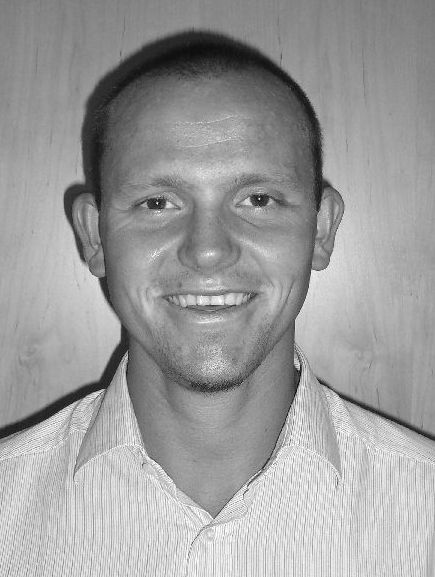 … ist der Titel einer der besten Diplom- bzw. Magisterarbeiten aller Studien der Technischen Fakultät an der Universität Klagenfurt und wurde vom Förderverein Technische Fakultät mit EUR 750,– ausgezeichnet. Der Autor und Preisträger, Herr DI Markus Aschinger und frühere Projektmitarbeiter am Institut für Angewandte Informatik, Forschungsgruppe Intelligente Systeme und Wirtschaftsinformatik, ist mittlerweile nach Oxford an die dortige Universität gewechselt um an seiner Dissertation zu arbeiten. Der Preis wurde im Rahmen der Eröffnung des akademischen Jahres 2010/2011 übergeben. Die zweite Preisträgerin stellen wir im Laufe der nächsten Woche vor, also beleiben Sie dran!
… ist der Titel einer der besten Diplom- bzw. Magisterarbeiten aller Studien der Technischen Fakultät an der Universität Klagenfurt und wurde vom Förderverein Technische Fakultät mit EUR 750,– ausgezeichnet. Der Autor und Preisträger, Herr DI Markus Aschinger und frühere Projektmitarbeiter am Institut für Angewandte Informatik, Forschungsgruppe Intelligente Systeme und Wirtschaftsinformatik, ist mittlerweile nach Oxford an die dortige Universität gewechselt um an seiner Dissertation zu arbeiten. Der Preis wurde im Rahmen der Eröffnung des akademischen Jahres 2010/2011 übergeben. Die zweite Preisträgerin stellen wir im Laufe der nächsten Woche vor, also beleiben Sie dran!
Kurzfassung:
Recommender-Systeme haben sich in den letzten Jahren zu einem fixen Bestandteil vieler E-Commerce Plattformen entwickelt und unterstützen potentielle Kunden, indem Sie ihnen personalisierte Produktvorschläge abgestimmt auf ihr Benutzer- und Anforderungsprofil unterbreiten. Ein Vorschlag beinhaltet dabei ein oder mehrere Objekte einer bestimmten Produktkategorie aus einer zumeist großen Menge an verfügbaren Produkten. In vielen E-Commerce Szenarien suchen Kunden jedoch nicht nach einem einzelnen Produkt, sondern nach einer Menge von wohlunterscheidbaren und aufeinander abgestimmten Produkten, die zusammen eine Einheit in Form eines Produktbündels bilden. Beispielsweise treffen Kunden im E-Tourismus bei einer Reiseplanung entweder eine Auswahl aus einer Reihe vordefinierter Packages oder sie kombinieren wahlweise Produkte wie Hotels, Restaurants, interessante Events oder Sehenswürdigkeiten, etc. Benutzer führen hierbei oft einen Synthesevorgang vergleichbar mit einem Konfigurationsprozess durch, wenn sie Produkte manuell zu Bündeln zusammenfügen und aufeinander abstimmen. Recommender-Systeme sind jedoch nur bedingt zur automatisierten Lösung dieser Problemstellung geeignet, da die bestgereihten Einzelprodukte nicht unbedingt das optimale Bündel ergeben müssen oder aufgrund von einzuhaltenden Restriktionen nicht miteinander kompatibel sind.
Die sich daraus ergebende Aufgabenstellung ist die automatisierte Ermittlung von Produktbündeln in Domänen wie beispielsweise dem E-Tourismus- oder dem Finanzdienstleistungssektor. Dies erfordert die Entwicklung eines intelligenten Konfigurationssystems, das einerseits die Konsistenz der Produktbündel garantiert und andererseits die Anforderungen und Präferenzen des Benutzers berücksichtigt.
Konfigurationssysteme haben sich in den letzten Jahren zu einer der erfolgreichsten Anwendungen von AI-Technologien entwickelt und erleichtern die Erstellung komplexer Produkte und Services durch die Reduktion von Fehlerraten und Durchlaufzeiten im Vergleich zu manuell gesteuerten Prozessen. Das Problem der Berechnung von Produktbündeln unterscheidet sich jedoch von traditionellen technischen Konfigurationsproblemen in der Form, dass der Suchraum durch eine geringere Anzahl an Nebenbedingungen eingeschränkt wird. Anstatt der Bildung eines neuen physischen Produktes handelt es sich hierbei um eine immaterielle Zusammensetzung bereits bestehender Produkte. Daraus folgt, dass die Anzahl an Kombinationsmöglichkeiten in der Regel weit größer ist und die Auffindung der optimalen Lösung bei Problemen dieser Art einen hohen Stellenwert hat. Bezüglich Optimalität sollte das System das Produktbündel ermitteln, das die Anforderungen und Präferenzen des Benutzers am besten erfüllt. Typische Konfiguratoren verfügen jedoch über keine bzw. unzureichende Personalisierungsmöglichkeiten, d.h. sie adaptieren ihr Berechnungsverfahren nicht aufgrund des aktuellen Benutzers.
Im Rahmen der Diplomarbeit ist ein wissensbasierter Konfigurator zur Lösung der genannten Aufgabenstellungen entwickelt worden, der durch die Kombination mit Recommender-Systemen um zusätzliche Personalisierungsfunktionalitäten erweitert wurde. Zur Sicherstellung der Konsistenz dient eine Wissensbasis, die die gültigen Produktkombinationen und die zu beachtenden Einschränkungen der Anwendungsdomäne beinhaltet. Beispielsweise sollten sich die empfohlenen Freizeitaktivitäten nach Möglichkeit in der Nähe der Unterkunft befinden oder vorgeschlagene Sehenswürdigkeiten für eine Familie explizit als für Kinder geeignet ausgewiesen sein.
In der Optimierung wird zwischen impliziten und expliziten Präferenzen unterschieden. Die Recommender ermitteln die bestgereihten Produktinstanzen für die einzelnen Leistungskategorien und ermöglichen somit durch die Vorfilterung des Problemraums die Berücksichtigung impliziter Benutzerpräferenzen, die sich aus einem Benutzermodell ableiten. Explizite Benutzerpräferenzen hingegen werden entweder in der Wissensbasis des Konfigurators abgelegt oder im Verlauf einer Interaktion vom jeweiligen Benutzer definiert. Die Reihung der ausgewählten Produktbündel wird unter Berücksichtigung der eben genannten impliziten und expliziten Präferenzen im Lösungsprozess optimiert. Der praktische Teil der Arbeit beinhaltet weiters die Umsetzung und Einbindung verschiedener Berechnungsmethoden, wie beispielsweise den Zugriff auf einen User Model Service oder auf einen System-Kontext, wodurch zusätzliche Informationen wie z.B. die Wettervorhersage in der Lösungsfindung berücksichtigt werden können.
Der gewählte Ansatz unterstützt einen mehrstufigen Interaktionsprozess während der Lösungssuche. Mehrere aufeinander aufbauende Suchvorgänge können logisch zu einer übergreifenden Session zusammengefasst werden, wobei diese auch zeitlich voneinander getrennt sein können. Die Menge der Präferenzen kann in jedem Interaktionsschritt basierend auf den vorgeschlagenen Lösungen erweitert bzw. modifiziert werden. Darüber hinaus können Teilmengen der berechneten Produktbündel in eine neue Lösungssuche übernommen werden. Man kann somit beispielsweise definieren, dass man mit dem vorgeschlagenen Hotel und den Veranstaltungen zufrieden ist, jedoch am letzten Abend in einem besseren Restaurant speisen möchte und dafür auch bereit ist, entsprechend mehr Geld auszugeben.
Die vorliegende Diplomarbeit gliedert sich in einen theoretischen und einen praktischen Teil. Beginnend mit einer Beschreibung der Problemstellung sowie des gewählten Lösungsansatzes wird anhand eines möglichen Szenarios aus dem E-Tourismus die Problemstellung näher erläutert. Anschließend wird zu den zentralen Themengebieten Constraint Programming und Konfiguration das wesentliche theoretische Hintergrundwissen aufbereitet. Konkret wird bezüglich Constraints auf Modellierungstechniken, aktuelle Lösungsverfahren und Optimierungstechniken eingegangen. Weiters werden derzeit verfügbare Constraint Programming Systeme vorgestellt und die Auswahl des für die praktische Realisierung verwendeten Tools begründet. Im Bezug auf Konfigurationssysteme erfolgt nach einer Begriffsabgrenzung und der Beschreibung möglicher Anwendungsgebiete eine Vorstellung und ein Vergleich verschiedener Wissensrepräsentationsmechanismen.
Für die konkrete Umsetzung wurde der Konfigurator in die Personalisierungsinfrastruktur ISeller eingebettet. Es erfolgt eine Beschreibung der Architektur des Gesamtframeworks sowie im speziellen des im Rahmen der Arbeit umgesetzten Konfigurators. Weiters werden die Komponenten des Frameworks vorgestellt, mit denen der Konfigurator interagiert bzw. die vom Konfigurator aufgerufen werden. Anschließend wird der verwendete Modellierungsansatz sowie die einzelnen Bestandteile des Modells vorgestellt. Darauf aufbauend erfolgt eine detaillierte Beschreibung des verwendeten Optimierungsmodells und der unterstützten Verfahren zur Lösungsermittlung. Zur Überprüfung der praktischen Einsetzbarkeit des Systems wurde eine Evaluierung auf Basis von Realdaten aus dem E-Tourismus durchgeführt. Die Evaluation hat gezeigt, dass der implementierte Ansatz in der Lage ist, Probleminstanzen von realistischer Größe in akzeptabler Zeit lösen zu können.

